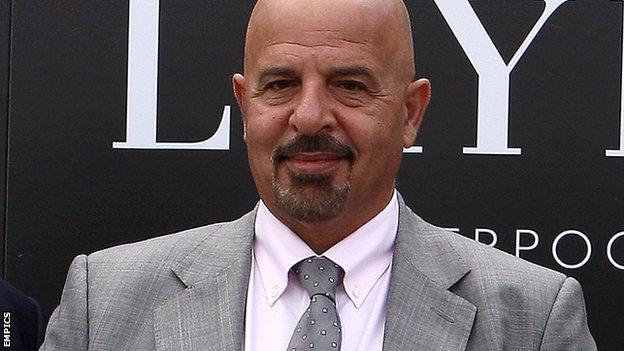Salford's ambitious owner pushes case for salary cap rethink
- Published

Picture the scene inside the BBC 5 live studio: a millionaire owner of a now managerless Super League club, a highly rated out-of-work coach keen for a return to the sport and an iconic player from a rival club that the owner wants to sign.
"Did you set this up?" Salford City Reds owner Dr Marwan Koukash asked, at the start of the station's rugby league hour this week.
The extravagant millionaire has grabbed the ailing Reds by the scruff of the neck and set about building a dream in arguably the sport's most crucial year.
Having ruffled feathers with his breathtakingly bold bids to sign Sam Tomkins and Adrian Morley, Koukash has promised to make the Super League strugglers the biggest rugby club in the country within three to four years. What he has definitely done is make people talk about Salford again.
Far from being a prickly atmosphere in the studio, there appeared to be real warmth between the extrovert racehorse owner, the man he wants to coach his club - Brian Noble, and the rugby league legend he wants to sign from Warrington - Adrian Morley.
"The more Marwan's the merrier, the better," said Noble, the former Great Britain and Bradford Bulls coach still waiting for the right opportunity to return to the sport., external "You just need passionate people with some substance behind them to push the game forward. His passion fills you with enthusiasm, you want to get going and get cracking."
Those comments will have been music to the ears of the fiercely ambitious Koukash, who learned the art of hard work during three years in a refugee camp in Jordan.
He admits he would be honoured for Noble to coach the team he is attempting to assemble at Salford. Another Brian - the Australian Brian Smith - is the other frontrunner.
I understand Noble is keen to work with Koukash, but only if he is convinced the dream of this businessman, tempted into the sport by the RFL's chief executive Nigel Wood, can become a reality.
A similar discussion about ambition and available funds saw Noble drop out of the running for the Castleford Tigers job before the appointment of Ian Millward, so Salford fans should not expect this to be a done deal.
Key to the 'Good Doctor's' dream - he was labelled the 'Mad Doctor' during his outlandish early claims of racehorse success - is his campaign to raise the sport's £1.8m salary cap. Koukash has, for the past few weeks, been lobbying to lift the limit that a club can spend on players to something nearer £2.5m.
His argument is that this will not only make the rugby league a more attractive proposition for the best players in Australia and halt a talent drain to rugby union,, external but even reverse the process and tempt union players to league.
Noble agrees that the cap may need a rethink - it was introduced to stop clubs overspending. But the only man to coach a club to three Super League Grand Final victories believes we might now need a carrot to bring in the bigger names to raise the sport's profile.
How much of a financial risk would this be?
This is a time the sport cannot even attract a title sponsor for Super League - a situation branded unacceptable by the St Helens chairman Eamonn McManus, who cites his own club's deal with tea-makers Typhoo as proof that the sport can pull in the blue-chip brands.
Angry Koukash promises Reds changes
Koukash clearly has cash and he wants to be able to spend it. But not every club is in a position to chase success in this way.
Morley suggests there should be a loophole introduced to have two or three "star name" players paid as much as you like outside of the salary cap.
Koukash added: "There should be a mechanism in the sport to allow certain scenarios, clubs or situations to go and spend above the cap."
The man who made his millions from racehorses clearly feels he will be unable to attract rugby league's thoroughbreds to Salford under the current guidelines.
Such an argument is unlikely to be met with a huge nod of approval from the likes of Leeds chief executive Gary Hetherington who has built his own successful business model on a strict sliding salary scale at the Super League champions.
The bigger question of course is that of the sport's profile in World Cup year. McManus says this is rugby league's "biggest single financial weakness".
This is not a question about allowing Salford to sign as many players as they want. It is about maximising the exposure of the sport to the world and reaping the financial rewards of that.
McManus says the game's governing body needs to take responsibility. "No sponsor is not acceptable. Either from the club's perspective or from that of the governing body," he said.
"Someone has to be answerable for that. It is something none of us are happy with and someone needs to be accountable."
McManus feels that if these weaknesses in the way the game is marketed are "readily identified and dealt with" then the game has never been in a stronger position to prosper and grow. Koukash will expect to be at the forefront of that.
- Published20 March 2013
- Published15 March 2013
- Published15 March 2013
- Published3 March 2013
- Published31 January 2013
- Published28 January 2013